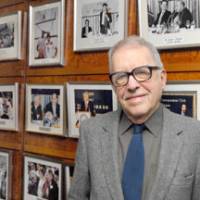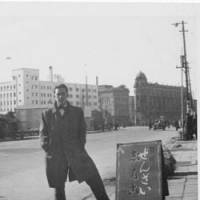On Dec. 7, 1941, a 17-year-old high school student named Donald Richie was fixing the fence at his house in Lima, Ohio, when his mother ran out on the porch to tell him and his father that she just heard over the radio that Japanese forces had attacked Pearl Harbor.
That afternoon, Richie's relatives came over. His uncles, aunts, mother and father started talking about the attack. He could see their anger grow, particularly when they learned how many Americans were killed.
They started looking at the back of their tableware. When they found anything that had "Made in Japan" on it, they smashed it.
"I don't remember doing it. But I must have done it, too," Richie said in an interview last month in Tokyo.
Now 84, Richie went on to live more than 60 years in Japan and become one of the most noted American authors on Japanese culture. But he knew nothing about the country back then.
As a writer, film critic, historian and author, whose books include "The Films of Akira Kurosawa," "One Hundred Years of Japanese Film" and "The Japan Journals: 1947-2004," Richie was named by Time magazine during the early 1990s as "the dean of Japan's art critics."
In 1942, Richie joined the merchant marines.
He served aboard Liberty Ships that carried anything ranging from high explosives to toilet paper and chocolates across the Atlantic to supply the U.S. Army and Navy.
As purser, Richie handled the payrolls and official papers. As medical officer, he was responsible for the health of some 70 fellow crew members.
Richie voyaged mainly to Europe, and a number of the ships on which he served were lost.
In Bari, Italy, a German bombing raid not only destroyed his ship, but the whole convoy as well as the city. Richie was not onboard his vessel and wasn't hurt.
In 1945, Richie was sent to China with forces transporting explosives and other materials to the Allied forces.
The Japanese were fleeing Shanghai as the war drew to a close.
En route back to America, Richie heard about the Japanese surrender on the ship's radio. He wasn't surprised.
After the war, the U.S. government sought people to work in Germany and Japan. Wishing to go to Germany, since he had visited Europe and was familiar with it, Richie took and passed the test in 1946.
He instead was sent to Japan, where his typewriting skills were in high demand.
On New Year's Day 1947, Richie's boat docked at Yokohama and he boarded a bus to Tokyo.
Although 1 1/2 years had passed since the surrender, the destruction of war was everywhere to be seen, Richie recalled.
Yokohama and Tokyo were in rubble. Between the two cities was just a charred plain, he said.
There may have been rich people, but Richie doesn't recall seeing any. Men still wore their military uniforms, and children were in school uniforms.
But he also saw enormous energy in the people. Even though they lived in poverty, they were out working and trying hard to make a new and better life. They were spontaneous, honest and admirable.
"I would have thought the Japanese people at their best, in their present poverty, and yet to find them so resilient, so optimistic, so looking forward into the future."
The people's optimism was surprising and inspiring.
Richie initially worked as a typist for the Occupation forces in Tokyo's Nihonbashi district.
But wishing to switch professions, he became a staff writer for the U.S. forces newspaper, Stars and Stripes.
Richie has been interested in culture since his childhood. He likes literature, painting, music and films. When he came to Japan, it was just a natural outcome that he became immersed in learning and reporting on the local culture.
And because there were so few articles about Japanese culture in Stars and Stripes, he began writing about anything he could think of: ikebana, Japanese gardens, kabuki and noh. Every day was a discovery for Richie.
"I knew nothing about Japan. But by reading a lot, talking a lot and seeing people a lot, I stayed about a week ahead of my readers."
The more Richie learned about the culture of "ma" (space) and "mu" (emptiness), minimalism, or respect for old things and people, the more he became determined to stay on in Japan and find out more about it.
Until around 1948, however, Richie did not know much about the 1945 U.S. atomic bombings in Hiroshima and Nagasaki.
"When I came here to work, we were told nothing about the bomb. . . . We were not allowed to go to Hiroshima . . . right until the end of the Occupation," he said.
Richie read the New Yorker magazine's publication of John Hersey's "Hiroshima."
"I still could not believe how horrible it had been," Richie recalled. "We realized not only that Hiroshima and Nagasaki were unnecessary, also that it was barbaric."
Richie believes people all over the world will continue to repeat the same mistakes over and over again if they learn nothing about history.
The new generation never pays attention to the older generation. Richie believes this is human nature — impossible to change. He said his perspective is not pessimistic or optimistic, just realistic.
And in Japan, students read government-censored textbooks, so they are not taught about what the war did to everyone and what happened to Japan and other countries, he says.
Despite his realism, Richie urges younger generations to learn history to avoid repeating the war.
"They should be more careful about themselves, more careful about their politicians."
In this series, The Japan Times interview firsthand witnesses of Japan's march to war and ensuing defeat who wish to pass on their experiences to younger generations. This is the 18th installment of the Witness to War series. To read more, the Witness to War archive.


















With your current subscription plan you can comment on stories. However, before writing your first comment, please create a display name in the Profile section of your subscriber account page.